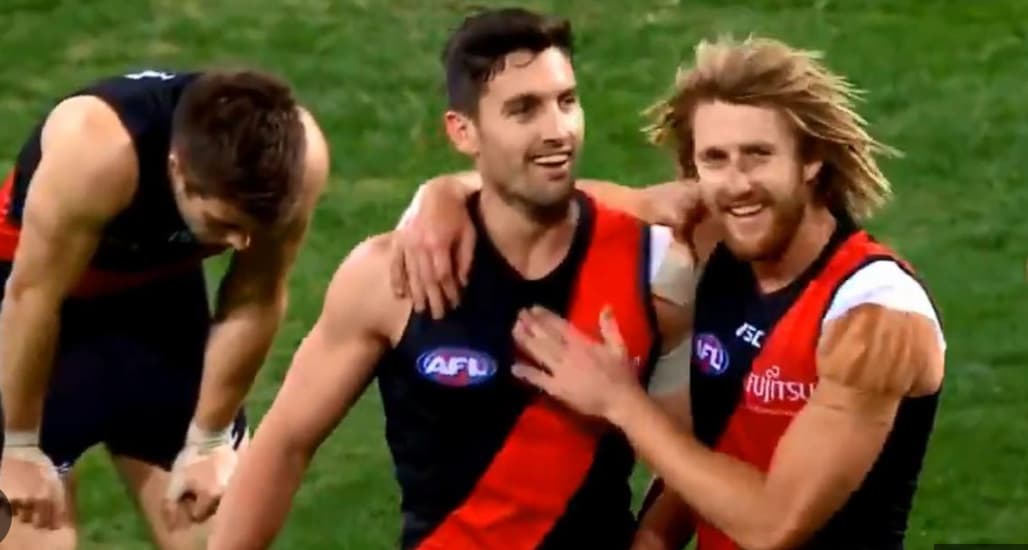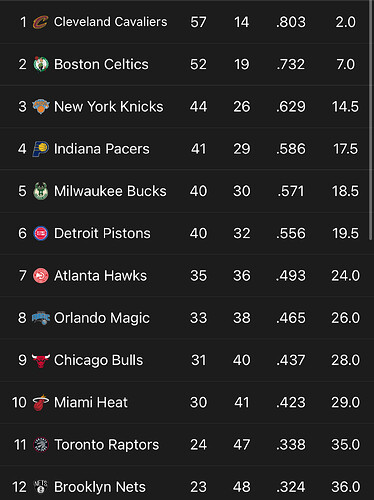The stain of the Heppell mates first and being a good guy mentality
Our main problem is we keep selection passengers and occasional performers
Top sides do not have passengers. At the top level one passenger can cost the game
We had about 6 v crows
Play the youth
The part of the draft where clubs find quality wings and flankers and that is really showing through now
Is there a rift in the team or coaching panel or between the 2.
I mean how do players zone off and leave the corridor open.
And how do players jog after opponents
Need a lieutenant like defender. Barking orders, getting everyone in position. Need a Hodge type. Never really replaced the quality of Hooker and Hurley.
Also need better kicks. Our top 5 would be the worst top 5 in the comp. And it doesn’t plateau, it just gets worse.
This is not a club in a rebuild. It is a club suffering from long-term competitive trauma. A systemic breakdown in identity, accountability, and emotional standards.
The image of Heppel & Myersl smiling after a loss, arm-in-arm having a chuckle, while Merrett—young, raw, and visibly devastated—hunches alone in the background. At the time, it was framed as camaraderie. In hindsight, it marked a shift in the club’s emotional compass—a moment where the pain of defeat was replaced by the optics of resilience. But in elite sport, resilience without accountability is just rebranded complacency.
Over time, the club has internalised the message and under Heppells leadership that effort is enough, connection is the goal, and results—well, they’ll come eventually. A culture formed where losses don’t sting, and standards don’t stick. What emerged wasn’t a team—it was a community of players emotionally reconciled with mediocrity.
The follow on has been profound. Essendon now fields a playing group that, despite physical potential, lacks the psychological sharpness required at the elite level. It is a side that does not bristle in defeat, does not respond with edge, and has no visible mechanism of internal pressure. These are not tactical flaws. They are cultural symptoms—deep, structural, and self-reinforcing.
This isn’t a matter of desire. Zach Merrett leads with intent. His body of work reflects commitment, not lip service. But one man cannot undo years of silent conditioning. A culture allowed to drift for a decade does not snap back overnight. It calcifies and through the likes of Mcgrath & co. it carries on.
The club, whether it realises it or not, has been operating under a quiet emotional misfire, that positivity is protective, and pressure is corrosive. The opposite is true. The world’s most elite sporting systems—Man City, All Blacks, Miami Heat—are built on a foundation of non-negotiable standards, internal consequence, and th sacredness of the result. They don’t apologise for it. They demand it. Every week. From everyone.
Essendon, by contrast, cultivated a past environment where outcomes are de-prioritised in favour of narrative: “We’re building,” “We’re in it together,” “We’re learning.” These are comforting slogans, not high-performance metrics.
From a psychological standpoint, Essendon’s most damaging adaptation has been the normalisation of failure. Losing no longer registers as disruption. It registers as process. There is no internal alarm bell, no visceral emotional recoil. And in elite sport, if losing no longer hurts, it no longer motivates.
The scoreboard is merely a reflection of a deeper, more dangerous truth: this is a club that no longer expects to win. And until that expectation is restored—authentically, relentlessly, and institutionally—results will continue to disappoint, not because the team isn’t good enough, but because the environment hasn’t demanded more.
Essendon doesn’t lack talent.
It doesn’t lack resources.
It doesn’t even lack effort.
It lacks emotional consequence.
It lacks mental edge.
It lacks players who take losing personally.
It is a standards issue. A mindset issue. A cultural issue.
And unless it is confronted without excuse, sentiment, or spin—the club will remain exactly where it is:
Well-meaning. Hard-working. And going nowhere.
Well, we’re pretty much completely ■■■■■■ then.
That honestly sums up what i’ve been thinking about since saturday and late last year.
Well articulated .
This line - It lacks emotional consequence sums up everything - were disappointed but but dont worry theres the next contest or there’s the next quarter - or next game or next year we’ll be better…wait what happened 20 years have gone past…oh ok - dont worry we got this…next year
We hadn’t won a final for 12 years before Dyson took over.
How many years removed from the saga was that image? You expect two players that were told they couldn’t train, let alone, play for the club (or any professional sport) to associate a game and the result of that game, if they win or lose, with something that adds value to their self worth? Because they participate in “elite sport”? Ok. Let’s put aside the personal crap they went through. We hadn’t won a final for years before that photo - what was the excuse then?
If you forget the photo and that moment - but focus on the points down the bottom of the post the message is still the same.
At what point do the players actually not accept a loss. Where is the consequence to them?
We get told they hurt - which i’m sure they do - they do have some element of competitiveness in them. But a truly ruthless side who won’t accept it and don’t- in game .
Look at Zorko at qtr time on the weekend then look at us at qtr time on the weekend - what looks different?
It’s true the bloke from Absolutely Essendon podcast said the same thing that’s how it looks when we play.
Always second to the ball and contest,fighting and scraping just to string a good passage of play when we do score it usually done by luck more then anything it’s bloody frustrating to watch.
Citeh are built in oil cash.
My bet would be the other way.
“This effort isn’t acceptable, the kids aren’t ready, play Goldstein, Setterfield & Laverde every week….”
The Miami Heat? They suck and pretty much have since buying those rings all those years ago. Every Heat home game I’ve been to has been half empty. They’re also 1-9 through their last 10 at the moment ![]()
The way I see it is
We go half a step this way
Then half a step back that way
I firmly and strongly believe the reactivity of board/presidents for 25 years has been the main contributor.
Just builds a culture of buck passing, whiteanting and scapegoating.
They’re never under the spotlight. Never. But they’re meant to be driving the ship.
So the worst run club at board level is the least successful?
Gee willikers, that’s a big coincidence!!
There might have been an argument for corporate wanker behaviour at board level when at least that corporate cash could assist in recruiting players.
Everything we’ve seen in the last two and a half decades suggests that thinking needs to be buried with Sheeds.
It was stark on Saturday, the players looked lost. They were really focussed on covering space and positioning, we were then picked apart. There was no focus on cutting off the leads, being on the front foot and aggressive in creating a turnover. This requires trust, if one player takes an aggressive position or leaves their man to influence a play further up the field, another player needs to roll up. You sometimes get caught out, but I think it’s worth the risk. I also thought we were spread too wide, we needed to be more compact in our structure. Funnily enough if we fix these things we may be competitive for a bit against Port, I am not confident in us winning.
It also requires effort and pressure and we dished up nothing on these fronts

